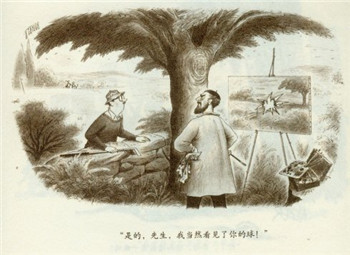问:你是《纽约客》的漫画编辑,HBO纪录片《幽默的严肃》(Very Semi-Serious)的主角。在影片中,当你不买账的时候,漫画家们就会向你尝试解释他们的作品。 你真的会被说服吗?
You’re the cartoon editor of The New Yorker and the subject of a new HBO documentary, “Very Semi-Serious.” In it, cartoonists often try to explain their cartoons to you if you aren’t initially sold. Does that ever work?
鲍勃·曼科夫(Bob Mankoff):我并非绝对正确。我或许是漫画之王,但不是教皇。不过,我会告诉漫画家,《纽约客》的漫画得让人“抓到”一些东西——至少,我们希望如此——而不应像一个谜题令读者猜不透。
I’m not infallible. I might be the king of cartoons; I’m not the pope. But what I say to cartoonists is that there is often something to “get” in New Yorker cartoons — anyway, we hope so — but it should never feel like a puzzle to the reader.
问:最近一些年,杂志漫画市场有所缩减,不过网上也有一些连环漫画网站大受欢迎,如The Oatmeal和xkcd。这会让你觉得还是有希望的吗?
The market for magazine cartoons has shrunk in recent years, but there are some wildly popular online comics like “The Oatmeal” and “xkcd.” Does that give you hope?
答:你知道吗,漫画作为一种艺术形式是不会灭亡的。就像蟑螂可以幸免于核带来的世界末日,漫画家也可以幸免于所有事。
You’re not going to be able to kill cartooning as an art form, you know? Like how cockroaches will survive nuclear apocalypse — cartoonists will survive everything, too.
问:你的工作内容似乎大部分是挑选要发表的漫画,真的会编辑它们吗?
Most of your job seems to be selecting cartoons for publication. Do you ever actually edit them?
答:那是我一直在做的事情。我试着让笑点的力度更强一些,或者紧凑一些——并非改变,也不是写一个完全不同的笑话,就是编辑它而已。之后,事实核对员和语法专家会介入。我经常会制止他们,虽然他们是专家,但有时候好的语法会把漫画的效果毁掉。
All the time. I try to punch up the joke or compress it — not change it, not write a completely different joke, but edit it. And then the fact checkers and grammarians get involved. I’ll often have to stop them because, though they’re experts, sometimes good grammar makes for a very bad cartoon.
问:漫画作品也需要做事实核对?
The cartoons are fact-checked?
答:绝对需要。我们把它们和已经发表过的8万幅作品进行比对。人们会一直有雷同的创意。同时,这些作品也会经历逻辑一致性的检查。之后你可以说,我知道了,旅鼠实际上是不会自杀的,不过为了漫画的效果,它们会了。
Absolutely. We check them against all 80,000 cartoons that we’ve ever published. People produce the same ideas all the time. They’re also checked for logical inconsistencies. Then you have to say, Yeah, I know lemmings don’t actually commit suicide, but for the purposes of cartoons, they do.
问:为杂志挑选的漫画作品和送往漫画配文大赛的作品,有什么不同?
What’s the difference between the cartoons that you put in the magazine and those that go in the caption contest?
答:配文大赛的作品不会是非常好的作品。我们通常挑选一个没那么喜欢的作品,然后把图说去掉。绝大多数漫画家完全可以接受这件事。我总是说,业余人士和专业人士之间的区别在于,业余的人喜欢自己做的每件事。
The caption-contest cartoons are not great cartoons. We usually pick a submission that we don’t particularly like and take the caption off. Most cartoonists are perfectly fine with that. I often say the difference between an amateur and a professional is that an amateur really likes everything they do.
问:你熟悉《纽约客》的漫画图说是万金油的说法——一个图说适用于每幅作品吗?
Are you familiar with the theory of the universal New Yorker cartoon caption: that there’s one caption that could work for every single cartoon?
答:太了解!最近的一句是“我想要在LinkedIn把你加入我的职业人脉”。每周,我都和大卫·瑞姆尼克(David Remnick)开会,漫画的最终决定权在他手上。在我展示给他的头10幅画中,我会把LinkedIn的这句图说都在所有的作品上。大卫会说,“这(脏话)是什么鬼?”
Oh, am I ever. One recent suggestion was, “I’d like to add you to my professional network on LinkedIn.” I have a meeting every week with David Remnick, and he makes the final decisions on the cartoons. For the first 10 I showed him, I printed the LinkedIn caption on all of them. David said, “What the [expletive] is this?”
问:他同意这么干过吗?
Did he publish one?
答:我解释以后,他说,“那我们就用一个。”幽默的一个有趣之处是,幽默无所不在,幽默有时拿自己开玩笑。
I explained it, and he said, “Let’s use one.” One of the interesting things about humor now is that it’s so pervasive, it can make fun of itself.
问:是我们变得更逗了,还是我们其实本来就挺逗的?
Are we funnier than we used to be or just more aware of how funny we are?
答:我觉得是我们变逗了。在这个社会里,如果你连幽默的皮毛都没有,会很难生存,即便你可能真的没有。耶稣如果回来,人们不会接受他,除非他上了《周六夜现场》(SNL)。
I think we’re funnier. You can’t exist in this society without at least having the appearance of a sense of humor, even if you don’t really have one. If Jesus Christ came back, he wouldn’t really be accepted unless he appeared on “S.N.L.”
问:在影片中,我注意到,在众多向你提交作品的漫画家中,没有一个人是有色人种。
In the movie, I noticed that among the cartoonists pitching to you, there wasn’t a single person of color.
答:除非灰白色也算作有色,我觉得你说得对。我们一直在推动多元化。不过这世界上没有那么多漫画家,好吗?做这个的报酬不会很好,所以,你不会赚许多许多的钱。不过,我们还是正在尝试。
Unless off-white is a color, I think you’re right. We’ve been pushing for more diversity. There’s not that many cartoonists in the world, O.K.? It’s not incredibly remunerative, so you’re not going to make an awful lot of money. But we’re trying.
问:有一项最新的调查是针对去年的漫画作品的,发现94%的漫画人物是白人。
There was a recent survey of last year’s cartoons, which found that around 94 percent of the characters in the cartoons are white.
答:我认为他们中的很多人还是犹太人。
And I think an awful lot of them are Jewish, too.
问:这个问题可能会使你陷入麻烦:猫还是狗,才是更好地漫画题材?
This might get you in trouble: Do dogs or cats make better cartoon material?
答:毫无疑问,是猫。我们可以让猫来表达很多东西。如果你回顾《纽约客》的漫画作品,20年代和30年代,猫和狗都不说话。可是一旦到了它们开始说话的40年代,它们就再也停不下来了。
No question, cats. We can project so much more onto cats. If you look back at the history of New Yorker cartoons, in the ’20s and ’30s, the cats and dogs don’t talk. And once they really start talking, in the ’40s, they don’t shut up.
问:你遇到过自己非常喜欢,但不适合在《纽约客》发表的作品吗?
Have you ever had a submission you loved but couldn’t print because it was unsuitable for The New Yorker?
答:有,所有带XX(脏话)的漫画。
Yeah, anything with [expletive] in it.
